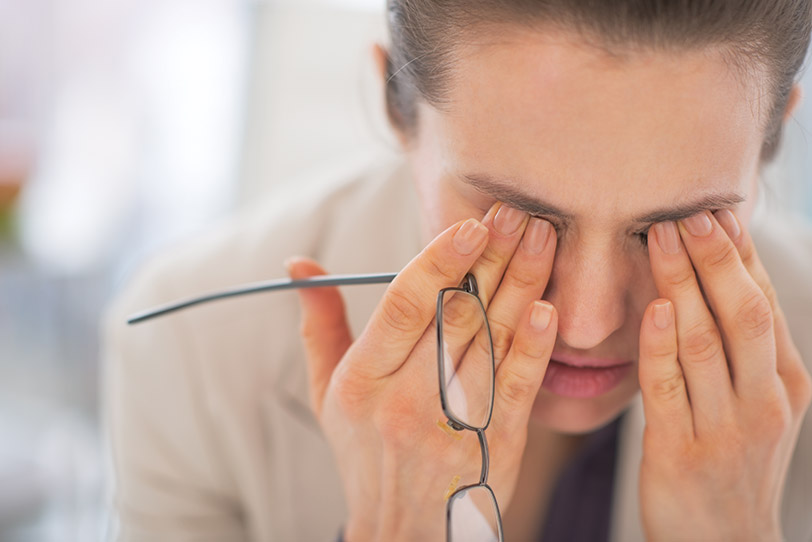Advertisement
Sleep Deprivation Can Be a Nightmare
The true cost of fatigue

They may not have known it at the time, but hundreds of airline passengers were lucky to walk away alive after two planes came dangerously close to each other near Vancouver International Airport in April 2011. The cause of the close call was likely fatigue: the air traffic controller was seriously sleep deprived.
Advertisement
Dangerous consequences
From disasters such as the Exxon Valdez oil spill to the partial nuclear meltdown at Three Mile Island, human impairment due to sleep deprivation has played a part. And while only certain horrific incidents make headlines, fatigue is pervasive in workplaces and homes everywhere, with negative effects on people’s physical, mental, and emotional health.
“Poor sleep has been associated with increased levels of stress, diabetes, heart conditions, [high] blood pressure, attention lapses, [reduced] motivation, and [lower] productivity,” says Sean Kerklaan, CEO of Fatigue Science, a company that has devised fatigue management technology that’s used by corporations, professional sports teams, and military units.
“There are so many consequences related to sleep deprivation that influence health, productivity, safety, performance, and sense of psychological well-being,” says Kerklaan.
Add to the list of detrimental effects a weakened immune system, poor memory, slower reaction time, diminished decision-making abilities, poor mood, the exacerbation of depression and anxiety, a link to obesity, and even increased mortality.
Advertisement
Fatigue versus alcohol
Perhaps the most sobering fact of all is that being tired can be just as dangerous as being drunk.
Consider some of Fatigue Science’s research. In a recent fatal single vehicle accident, for example, the company found that the level of fatigue the driver would have been suffering at the time was equivalent to having a blood alcohol level between about 0.08 and 0.05 percent in terms of her reaction time and ability to concentrate.
Based on data derived from what it calls a Fatigue Avoidance Scheduling Tool (FAST), which analyzed the driver’s schedule leading up to the accident, Fatigue Science found that the driver was likely slower to react by 34 percent and more than four times as likely to suffer a microsleep—a period of sleep that lasts up to a few seconds—than someone who was sufficiently rested.
Advertisement
Slow-burning fuse
The effects of sleep deprivation are cumulative. Using its FAST software to assess the performance of someone sleeping from midnight until 6 am over a two-week stretch, Fatigue Science determined that effectiveness would drop by 19 percent and reaction time by 24 percent. The chronically sleep-deprived person would be three times more likely to suffer an excessively long lapse in reaction time than someone who’s well-rested.
“The only way people can ensure they’re not cognitively fatigued is to get enough sleep and get it consistently,” says Kerklaan. “People need seven to nine hours of sleep per night to maintain health and daily mental performance.”
Advertisement
Sleep devalued
In our wired, 24-7 world in which people are facing more demands than ever, getting a good night’s rest is typically the one thing that gets cut. We soldier on, complaining about how tired we are between trips to our nearest coffee shop.
“People wear lack of sleep as a badge of honour,” says Atul Khullar, medical director of the Northern Alberta Sleep Clinic. “That’s a psychological mindset that leads us to devaluate sleep and not to make sleep a priority.”
In his practice, Khullar sees everything from disorders such as sleep apnea (when breathing stops and starts) to sleep deprivation.
“Common causes of fatigue are poor sleep behaviours or when people are overstressed in their lives; sometimes it’s a manifestation of depression or anxiety,” says Khullar. “Someone may present with mood problems or they’re nodding off during meetings, both of which can be due to lack of sleep.”
He adds, “There’s a coffee shop on every corner for a reason. People are fully aware of how sleep deprived they are—they can’t go for long without a significant amount of caffeine, which just makes the problem worse. People really have to make a commitment to make sleep part of their life. They will get more done if they get proper sleep.”
Advertisement
Workplace disturbance
A recent study showed that 76 percent of US workers surveyed feel tired many days of the week, while 15 percent fall asleep during the day at least once per week.
A 2008 poll conducted by the Washington, DC-based National Sleep Foundation found that 29 percent of people surveyed said they had fallen asleep or became very sleepy at work in the previous month. More than a quarter of workers said that drowsiness interferes with their daily activities at least a few days each month.
The direct and indirect costs of sleep disorders are high. A report commissioned by Australia’s Sleep Health Foundation estimated that the total financial cost of sleep disorders in Australia in 2010 was A$5.1 billion (C$4.8 billion), while the total economic cost (including non-financial costs) was estimated to be A$36.4 billion (C$34.2 billion).
Then there are the effects of people’s lethargy on a company’s bottom line.
“When people are feeling groggy, when they can’t get out of bed, they end up taking more sick days,” says Toronto naturopathic doctor Chris Habib. “They can’t function, so they find their capacity for work has decreased. They’re less productive. They’re quicker to anger, and they have a shorter fuse. They find their capacity for social interaction has decreased. As a result of all that, they’re more exhausted and more stressed, and it’s a cycle that feeds on itself negatively.”
Advertisement
Sleep and health
“I frequently see people whose lack of sleep is causing health issues and vice versa,” says Habib. “Sleep is such an important component of mental health. A lot of people who have insomnia end up suffering from depression or anxiety as a result … and a lot of people with anxiety will wake up in the middle of the night, and all they can think of is work.”
The good news is that improved sleep means enhanced health.
“People can feel better and be better at sports or at work if they prioritize getting enough sleep,” Kerklaan says. “The projects we’ve done for companies have influenced lifestyle changes with their employees and helped create a work culture that promotes sleep. People are safer on the job, and the bonus is that they start to feel good and are more productive as well.”
Advertisement
Homeopathic sleep aids
The type of homeopathic sleep aid prescribed for you will depend on the underlying emotional cause of your insomnia. Commonly used homeopathic remedies include
- Nux vomica
- Coffea
- Chamomilla
- Valeriana
Advertisement
Supplements to promote a good night’s sleep
These supplements have shown promise in some studies, though more research is needed to fully understand their mechanisms of action.
GABA
Gamma-aminobutyric acid (GABA) is a neurotransmitter that blocks impulses between nerve cells in the brain and seems to have a calming effect on the nervous system.
“For people who have difficulty falling asleep because they have restless thoughts, GABA can be relaxing and reduce the amount of those restless thoughts, helping people fall asleep,” says naturopathic doctor Chris Habib.
Valerian
The herb valerian is often used to treat insomnia. It’s also frequently used in conjunction with other herbs. “Supplements that combine GABA, valerian, skullcap, and lemon balm, each in a specific dose, can be helpful,” says Habib.
Melatonin
Melatonin is a hormone produced by the pineal gland that helps control our sleep and wake cycles. Normally, melatonin levels go up in the evening and remain high for most of the night, then drop in the early morning. Natural melatonin levels decrease gradually with age. Melatonin supplements are used to treat insomnia and jet lag.
Consult your health care practitioner for appropriate dosage information before trying new herbs or supplements.
Advertisement
Strategies to improve your sleep
Practise sleep hygiene
This involves avoiding caffeine, nicotine, and alcohol, especially in the evenings; ensuring that your bed is only used for sleeping or sex; getting physical activity during the day; and not doing anything stressful in the bedroom (such as work), says Habib.
“Identify any obstacles to good sleep,” he says. “Ensure that the room is quiet and dark. You can try wearing a face mask or using ear plugs. It’s good to have a nighttime routine; make sure you wind down.”
Avoid screen time
That includes television, laptops, cellphones, and other mobile devices.
“There should be no electronic media in the bedroom,” says Khullar. “The phone is the worst. People end up texting or using it as an alarm clock, but it’s very distracting. The light emitted from these devices can keep us awake.”
Try not to nap late
“If you have to, do it earlier in the day and not for as long,” Khullar says. Keep naps to a maximum of 30 minutes, ideally between 2 and 3 pm.
Don’t lie awake
“Stop watching the clock,” Khullar says. “If you’re awake, you should be getting up. Sit quietly somewhere else and do something very boring. Go back to bed when you feel tired.”
Rein in worries
If anxiety is preventing you from falling asleep or is waking you up in the middle of the night, Habib says approaches like meditation, deep breathing, and mindfulness can help.





